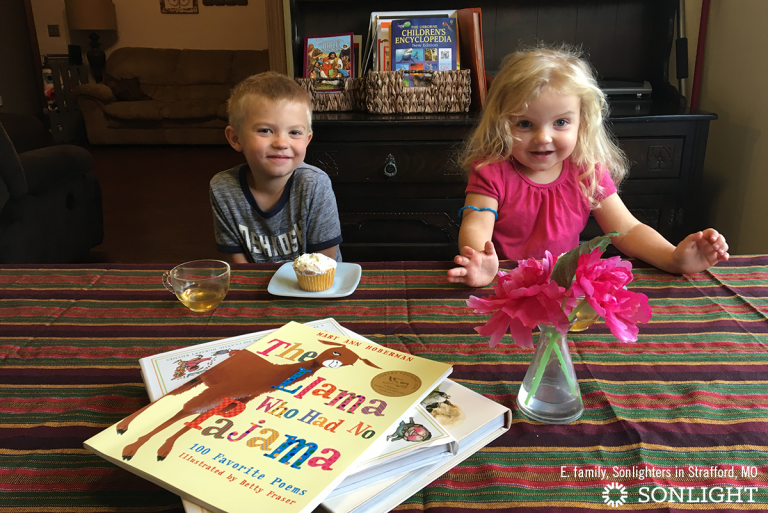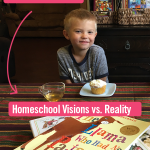
You had a picture in your mind of what your homeschool day would look like. After eating a nutritious breakfast, your children would dutifully go to their books. The older children would work independently while you did phonics activities with the preschooler and your toddler played happily with the ocean-themed sensory box that you had prepared the evening before.
Mid-morning, everyone would come together for History / Bible / Literature time. Your oldest asks insightful questions as you finish each book. All children listen attentively and display clear signs that they have taken their learning to heart. Afterwards, the youngest play on their own while you check in with the older children's independent schoolwork. You give a spelling test and check math worksheets. While their answers aren't perfect, most scores are above 90% and show diligence.
Your oldest daughter entertains the younger children by leading a hands-on science experiment that was scheduled in her Instructor's Guide while you make lunch.
Then you eat a lunch where each person cleans their plate, and as nearly always happens, you're done with all official school tasks for the day by noon, leaving both you and the children free to spend the afternoon in creative pursuits, skill building, and the keeping of the home and yard.
Then Real-Life Homeschooling Begins
That's what you imagined homeschool would look like? Right?
- All of your kids would progress smoothly from one level to the next without going backward and forward.
- They would want to learn.
- They would listen attentively as you read stories.
- They would usually try their best.
- Sibling relationships would generally flourish.
But now you're homeschooling for real, and your four year old still can't identify her shapes after months of trying every activity you know. Or your fourteen year old asks you for help with a chemistry problem, but doesn't have the patience to wait while you try to figure out the answer, and stomps away, saying, "Never mind, it'll be faster if I figure it out myself." Or one child decides to take the easy way out with his math test and is found copying answers out of the answer key instead of solving the problems; problems that you know he knows how to solve!
Or you find yourself re-reading the scheduled Bible passage because all of the children looked blankly at you when you asked them comprehension questions. Another child ends up distracting herself from her tasks so much that she still has books not read and worksheets not done at bedtime, every single night. Your oldest complains that you never give her enough time for reading even though she averages an entire book a day. Your second child writes her name, very neatly, on her notebook, only it is spelled entirely backwards and every letter is upside down—and she can't tell the difference. The baby rips a page out of a school book when the six year old grabs it out of her hands. The eight year old made the six year old cry by taunting her about how she won't get any birthday presents. The birthday is six months away.
Your Homeschool Isn’t What You Imagined
Your homeschool probably doesn't look like the idyllic homeschool you once dreamed it would be. If you allow yourself to become disheartened by this, you might start to lose faith in your ability to educate your own children.
When they don't learn along the "normal" time frame, and when there are behavioral problems that interrupt everybody's day, you might start to think that someone else might be better cut out for the role of teacher.
Identify What’s Causing the Disappointment
Sometimes, when you feel disappointed by your homeschool, there are actual problems that do need to be addressed:
- The curriculum you’ve chosen really isn’t working for a particular child.
- The schedule you’ve picked doesn’t fit your current lifestyle.
- You’ve taken on too many outside activities and everyone in the family is getting stressed out.
Take the time to stop and consider, looking back at your homeschool experience so far. Decide whether the frustration you’re experiencing is due to consistent negative patterns that need to change. In that case, identify the underlying problems and seek solutions.
If your frustration is simply because your homeschool doesn’t look quite the way it did in your daydreams, you may need to accept that your expectations were unrealistic.
Shift Your Focus from the Disappointment
Instead of expecting perfection of yourself as a homeschool mom or of your children, expect moments of wonder and of light. Look for those!
Because even in the midst of some of the most imperfect of homeschool days, there are glimpses of the beauty that homeschool brings. And those glimpses—and our gratitude for them—are what keep us persisting when a child suddenly forgets how to add after having been able to do it for over a year. In fact, perhaps those exact moments of getting to come alongside and help our kids when they are really struggling to learn a concept...maybe those are actually among the greatest gifts that homeschooling offers.
That we, who know our own families the best, get to be right there to help them when a skill that comes easily to others doesn't make sense to them. That we get to be the first responders when they learn about the consequences of being lazy in learning. Perhaps, when we shift our perspective, we might even appreciate the gifts contained in the imperfections that ingrain themselves into our homeschool day.









